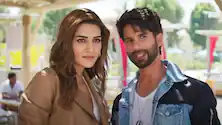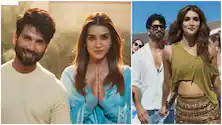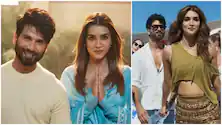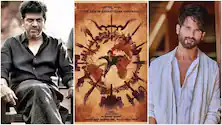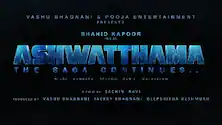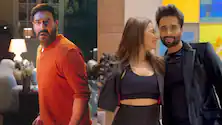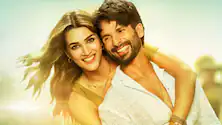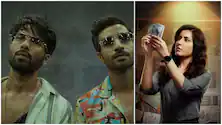INTERVIEW! Shahid Kapoor: I Would Have Played Alauddin Khilji Differently!
Post the release of Padmaavat, we caught up with Shahid Kapoor for a hold no barred conversation on his role, being pitted against a performer like Ranveer Singh and the controversial 'jauhar' scene.
Recommended Video

'I have always waited for longer than most people to get milestones', quipped Shahid Kapoor when asked about Padmaavat being his highest grossing film in his 15 year-old career. The happiness on the actor's face spoke volumes!
But it wasn't any easy journey for Sasha who calls the film one of his 'toughest decision' where he had to swim against the tide to pass out with flying colors.
Over to the actor....

'Whenever My Father Likes My Work, He Gives Me A Tight Hug After Which He Pulls My Cheeks & Then We Have A Long Chat Over Coffee'
Q. With all the controversies surrounding Padmaavat, was there a time when you had doubts about the film making it to the theatrical screens?
A. Except for a moment or two when I doubted about the film's release, I was pretty sure 99% that it would make it to the theatres. I feel shocked even now that it isn't releasing in a few places.
Q. How did your father Pankaj Kapur react to the film?
A. Whenever my father likes my work, he gives me a tight hug after which he pulls my cheeks. Then, we have a long chat over coffee. That's exactly what he did after watching this film twice. However, our coffee date is still pending since I am busy with all the post-release promotions. (laughs)

'Sanjay Leela Bhansali Is A Mad Genius; Either You Stay With Him Or Get Left Behind'
Q. Sanjay Leela Bhansali is known to be quite a taskmaster. How was your working experience with him?
A. I meet Sanjay Sir for the first time when he dropped at my place to discuss the role. He looked at me and said, "Shahid, I have heard a lot about you." I stopped him in between and quipped, "Sir, even I have heard a lot about you." Hearing that, we both laughed a lot. That's it. After that, the journey was amazing.
SLB has an endless desire to achieve excellence and create a benchmark for himself. Whenever it comes to extracting performances, there are no limitations for him. I think people misunderstand this and present him in a negative way saying that he is a very difficult person to work with. People who fail to match up to his benchmark or lack fortitude and long-term focus shouldn't work with him as they may find it hard.
I enjoyed a lot while working with him and observing how he presents such beautiful visuals on-screen. I have worked with a lot of big directors but I would say that he is a mad genius. Either you stay with him or get left behind. There's no other way.
Q.
What
were
the
conversations
that
you
had
with
Mr
Bhansali
and
the
team
when
the
film
was
going
through
that
rough
patch?
A. We all were in a shock. Everyone was very disillusioned and disheartened. Because, the intent of the film in our minds was very clearly to glorify the whole of Indian culture and not just the Rajputs.
The film is about an invader who came from outside India and fought a battle against an Indian king and his queen only to acquire the queen. The Rajput side of the film represents the Indians. We saw the film like that in our hearts.
The intent behind the film was only to show the glorious sacrifice that was made and the valor that was shown when you are pitted against such a large enemy, to hold fort and to have so much dignity while dealing with it. These things were at the forefront of all our minds. But, a very different version was being given out and the only thing that we wanted was the film to be seen.
If people think we have done something wrong then okay, but first they should watch the film and then say it. Do not judge the film before. Of course, it was very difficult and take a toil on all of us. We were all just praying and hoping.

'With Choosing To Do Padmaavat, I Decided To Swim Against The Tide This Time'
Q. It was quite bold of you to take up this role. Because things could have gone terribly wrong if you weren't able to pull it off. Were you skeptical about taking up such a part?
A. The big issue which happens with our audience sometimes is that people think the character is the performance. They attribute and put that together. Over the years as an actor, I have understood that every character has its pros and cons and has its own space within which it has to form itself. An actor has to be like water. He should take the shape of whichever vessel you put him into. I feel the finest actors over a period of time have done that and I aspire to be like that.
Everybody has an opinion and wants to tell the world that an actor will play a character that way. This is the mindset that we have. The constant endeavor for every actor who wants to be known as an actor is break those shackles and surprise people by doing different things. They should not get limited by what the world thinks they are. Every great creative person is always able to break through that. That's why they are great because they shock you.
In 15 years I have learnt that I want to attempt different things. I don't want to be put into any particular space. Yes, it was quite challenging for me to do this role in the film. To begin with, Maharawal Ratan Singh is the least known of the three characters. Historically, not much is said about him. We know people are restricted to some extent subconsciously. Everybody knows a little about Rani Padmavati and Alauddin Khilji. Most people don't know anything about Maharawal Ratan Singh. So, I had to introduce them to a character in a film which has two author-backed roles. I had to introduce them to a character which is anyways underplayed, very internalized and is not somebody who speaks so much. That was quite a big challenge.
Maybe four years back, I would say I wouldn't have the security and the confidence to take this up but, now when it came to me it looked at it as a challenge and I decided to swim against the tide this time and maybe become a better swimmer.I do feel it has thought me a lot as an actor in playing this role in this film.
I refrained from speaking to anybody till two days after the film released. For a year and a half while Padmaavat was being filmed, I never spoke about Maharawal Ratan Singh or what the character was in any of my interviews. I consciously chose not to talk about it till people watched the film to avoid controversies around mine and Ranveer Singh's roles. I wanted my work to speak for itself. I waited till two days after the film released to step out and meet people to talk to them. I wanted to know if the audience felt the effort which I have put into for one and a half year. I feel very happy because I got a very different reaction this time.
Everybody feels that actors are privileged. To some extent, we are. We think, 'Isko toh itna accha role mila toh kar liye, humko toh aisa mauka hi nahin milta'. I too had such feelings when I wasn't an actor. In fact even now when I have become one, sometimes I feel I could have played a role better than the actor portraying it. That's quite a nature feeling.
This was the first time that everybody recognized that I have such a limited opportunity as an actor. People called me and complimented that it was quite brave of me to take up this role. They told me that I really got it somehow.

'My Biggest Challenge Was That My Character Was Pitted Against Ranveer's Which Was All There Asking For Attention'
Q. Did you feel that the role was quite uni-dimensional? People felt that it didn't have as many layers but your performance added that to it?
A. I would give a lot of credit to Sanjay Sir. It wouldn't have been possible for me to pull off that role without his support and love. Having said that, yes, it was the most limited of the three characters in terms of range. It had a defined space and I had to somehow max that space that wasn't noisy and jumping out of the screen. It was pitted against a character (Ranveer's) which is like that. His character was all there, asking for attention. Mine had to emote without saying any thing. That was the biggest challenge for me and like I said before, it was like swimming against the tide. I had to swim much harder to achieve that same speed. That's why I said maybe two years back, I wouldn't have the confidence to do that because I am the newest entrant in this team. (Ranveer Singh, Deepika Padukone and Sanjay Leela Bhansali have worked together before).
There are certain filmmakers and actors who compliment and bring out the best in each other. I know this team does that for each other. So to enter into that role in that team at that stage in my career was what most people would say was the stupidest decision of my role. But I feel this was the toughest decision of my life.

'I Was Pitted Against Very High Odds'
Q. But what gave you that confidence to take up this challenge?
A. Different people have different destinies. I think Rawal Ratan Singh's situation in Padmaavat is very similar to Shahid's situation as an actor in Padmaavat (laughs). I was pitted against very high odds in a very unlikely situation. I had to somehow come out with flying colors.
My life has always been like that. I have always worked very hard to get opportunities. I have always waited for longer than most people to get milestones. But I view it like God has given me the opportunity to learn. He has given me the destiny of a student. I have never given the same exam twice; I have always given different exams and every time it has been a new challenge. I feel that adds to my experience. It adds to me because I learn to do different things. I knew that this opportunity is very tricky and it can go horribly wrong and I don't need to do that to myself at this stage of my career because I am coming from Haider and Udta Punjab and people really think I am good and like that.
I needed to participate in Padmaavat because the opportunities that will come to me and some of which are already with me after this film will become bigger. Another thing which I felt very strongly is that I have seen every actor who has worked with Sanjay Sir, he has taken them five steps ahead from where they were. There's a sudden jump in people's perception and reach as an actor. I wanted to be that guy because I knew I am the hero of the film. Of course, the role is difficult. I wanted that. I knew that I had to give a very big test for a big outcome. I knew that it was not a 'single-hero' film. (bursts into laughter). But for me, the tests have always been tough. It's never been easy so I am used to it.

'If Padmaavat Didn't Do Well, It Would Have Been A Disaster'
Q. Padmaavat has crossed the 100 crore mark. How does it feel?
A. Honestly, I knew this would achieve that when I signed the film. If it didn't do that, it would have been a disaster. The more important question was of course, by the time we reach the release, we were scared of everything. We just wanted the film to release as we were quite petrified.
The bigger questions were whether I could take the ownership of this film or not. Can I stand tall and say that it was a good decision that I took? Will I be able to perform under a filmmaker like Sanjay Leela Bhansali who is very unique in the way he works and has a very different process of work and how well would we gel with each other? How will I make my presence felt in a film where there are other two roles- one the titular and another a very author-backed villain?
These days, most of the characters played are edgy, dark and negative which are very attractive. It's been a long time since somebody has played a really nice, good, credible guy who is also attractive. So, I had to go really far back in time. I had to draw references from Dilip Kumar Sa'ab from Mughal Azam and what Mr Bachchan did in Sholay. I had to really far back and see how these great actors would able to make an impact in those role. I had these thought processes constantly. I was always struggling and wondering that how things would eventually shape out.

'I Would Have Played Alauddin Khilji Differently'
Q. Were you never tempted to take up Alauddin Khilji's role?
A. Which actor wouldn't feel that way? I remember watching an old interview of Ranveer Singh on Koffee With Karan where he had said that he would have done Kaminey better than Shahid. So every actor has a thought in his mind that he could do a role better than originally portrayed. I would say that I would have played Khilji differently.
Q. Did you remind Ranveer of what he had said when you met him on the sets?
A. I wasn't replying naa because I was playing a character who doesn't talk. I was in character. 'Jo thha mann mein reh gaya' (laughs)

'My Favourite Scenes Are The Ones With Ranveer'
Q. Shahid, you are a good actor. But does the dynamics change when you have a powerful performer opposite you?
A. Instead it improves and stands. Acting is not squash; it's like 'table-tennis'. You are not hitting a ball and it is coming back and you are hitting it. Here, you hit the ball and something else will come from the other side. So, then you need to hit the ball in a different way. That's what makes it exciting. My favourite scenes are the ones with Ranveer. The dynamics between those two characters is so interesting. It was really nice to figure out how to do it. That's quite exhilarating and gives you that adrenaline when you know you have to pull something off which is so difficult. That's when you come on as an actor and put your best game on.

'It's Sanjay Leela Bhansali First & Anyone Else Comes Next'
Q. Earlier you said that 'you would have played Khilji differently'. What did you mean by that?
A. I don't know. I don't want to get into the specifics of it. But I think we (he and Ranveer) are very different actors. Firstly, nobody can take the credit for anything in this film. Sanjay Leela Bhansali is the hero of every film that he makes. Everything that happens in this film is created by him.
If a character is larger-than-life, it's because of the way he had presented it. If a character is subtle and underplayed, it's because SLB wanted him to be that way. If a film is doing Rs. 300 crore business, it's because of the film he makes that film. None of us have that. Nobody else can take the credit of the film doing so well and say that it has turned out good because of him/her. It's Sanjay Leela Bhansali first and everyone else comes next. Everything that happens in this film is driven by him. The interpretation of the characters is also very largely governed by him.

'If You Want To Work With The Best Directors In The Country Then You Have To Bring In Big Numbers'
Q. You have done some fantastic roles in your career. But box-office wise, those films may not have raked in enough numbers. Did you ever feel that why were you being pitted against these 100 crore- 200 crore club? What's the importance of box office numbers for you?
A. Box office numbers are important. Okay, I will be very honest here. The biggest directors of our country want to make the biggest films for which they want to cast bigger stars. If you want to work with the best directors in the country then you have to bring in big numbers otherwise you won't get the opportunities. That's the truth. That's why I would want to have films that bring in numbers because I want to work with the best and the biggest names.
Q. Yet you choose to do a film like Udta Punjab...
A. I have my father's blood in me. What to do? (smiles) If a character excites me, I can't say no to it. If what is written on the paper jumps out and it touches me here (points towards his heart), then I stop thinking about everything else.
Q. If you compare your initial days in the industry to today's times, do you think we have moved beyond the formulaic hero?
A. The audience has moved beyond a lot of things. The media and us as a fraternity- actors and filmmakers on the other hand, are still stuck with the stereotypes. We keep reminding the audience about something which I think has long become outdated. There are no rules. We have worked for so many years so we think that we know.
One thing which I learnt in the last three-four years is that none of us know anything. The audience will give you an answer which will come only after you have asked a question. You cannot think what an answer could be before asking. Making a movie is like asking a question. The response will come to you and you will come to know whether you have made a right movie or not only after making it. The problem is that we are all trying the judge what the future is going to be and that's the biggest mistake that we make.
Q. Shyam Benegal's 1980s television series Bharat Ek Khoj had Late. Om Puri playing Alauddin Khilji. Many felt that Ranveer's version of Khilji in Padmaavat was way different and more larger-than-life. What's your take on it?
A. Every person has a different interpretation. Padmaavat would have a different film if some other filmmaker would have attempted to make it. Films are a personal expression and that's the basic right every creative person has- to express his perspective or point of view. This was Bhansali's point of view.

'I Know I Have Surprised Filmmakers With Padmaavat'
Q. Has Padmaavat opened more doors for you?
A. I don't know. I am yet to get out of the Padmaavat zone. I already have signed two films- 'Batti Gul Meter Chalu' and a film with Imtiaz Ali. I have received immense love from the audience. I always wanted the people to feel the sacrifice, goodness, grit and dignity of Maharawal Ratan Rawal Singh. In fact, his death scene in the film is very close to my heart.
I have delivered a couple of back-to-back flops in my career. So, I know that whenever you do some good work, people are ready to forgive you for those failures. I received immense love for films like Jab We Met, Vivaah and people forgave me for two-three mistakes committed in my career and gave me yet another opportunity. Of course you need to get better at your job and make smarter decisions. People have too many options today so you can't afford to make too many mistakes.
With Padmaavat, I know I have surprised filmmakers and have created a new character.
Q. Any pressure of reuniting with Imtiaz Ali for a film?
A. That's why he didn't come back to me for 10 years. (laughs) He must have thought that there is so much hype still left with Jab We Met that we cannot do something better than this.

'It Was Traumatic When I Took Off My Moustache & Beard & My Daughter Misha Failed To Recognize Me For Two Hours'
Q. You said that Padmaavat was an emotionally draining process. Was it difficult for you to unwind yourself away from the character once you finished shooting for the film?
A. Fortunately I have my daughter Misha. It takes just 30 seconds to forget everything when you are with her. So, it wasn't difficult. She visited us one day on the set when we were shooting the Sinhala forest portion. She played in the mud like nobody's business. We had to halt the shooting for 20 minutes because she just refused to leave the frame. She saw the grass, mud and the trees which looked so real. That was one moment which I will truly remember.
Another moment which I cherish is when I take my moustache and beard off, she failed to recognize me for two hours. That was traumatic. She was like 'he sounds like my dad but doesn't look like my dad'. I hope someday she grows up enough to see the film and enjoy it and kind of understand. She's been my strength through this whole film.

'Misha Thinks Everybody's Papas Are Supposed To Be On Magazines'
Q. How does she react when she sees you on-screen?
A. She doesn't see much. I haven't shown her much. Whenever she sees me on-screen she just says 'papa'. She thinks everybody's papas are supposed to be on magazines and all. She sees me in those photos and is like 'that's papa'. She's to young. Maybe in a bit, she will have a little more awareness.
Q. What's your biggest takeaway from your character?
A. There are certain characters which you want to forget because of whatever reasons it might have like 'Haider' or 'Udta Punjab'. This is one character which I want to hold on to as many qualities as he has. I really look upto him as a character. I learnt a lot from him. I had to really delve into a lot for myself to understand. It's very easy to act if you want to just act it. But if truly feel it then you have to genuinely ask yourself some questions to see how you reach a point where you understand how a man in that situation actually behaved like that. So, I had to dig very deep within myself to find those qualities. At the end of the day, we are not pitted against such big situations today. Those kind of things don't happen. So, I truly had to believe that and own it. My character had lesser words so I had to truly represent him in every frame.
He has thought me a lot and I can hold on to most of his qualities.
Q. How similar are you to your character in real life?
A. Well, he used to listen to his wife and I listen to mine

'We Had Those Outfits And The Background & We Worked Really Hard To Make It Look Like 13rd Century Era; Beyond That What Can A Filmmaker Do?'
Q. Finally, the kind of debate or discussion that Padmaavat has opened and it's great because that's what art should do. A lot of people spoke about the apparent 'glorification' of the jauhar scene. As a part of the film, what do you have to say to that criticism?
A. I respect everybody's point of view. Films should be seen in its context of the time, socio-cultural atmosphere and the reason why the act was committed; whether it was enforced or done willingly and why certain characters in our history are viewed in such a glorious light over so many centuries. If it wasn't worth glorifying then why do people pray to her? What was the choice for that character? Let the plunderer come and do what they want or hold her dignity and walk away. That's the context of the film.
Q. Maybe a lot of people saw this film from today's lens which might be a mistake...
A. But we had those outfits and the background and we really worked hard to make it the era look like 13rd century. More than that what can a filmmaker do? Beyond that, it's a matter of opinion and everybody has the right to one.




 Click it and Unblock the Notifications
Click it and Unblock the Notifications





